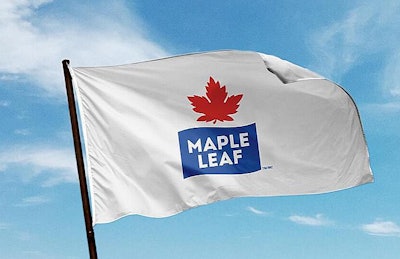
Maple Leaf Foods on November 28 began production at its new value-added poultry plant in London, Ontario.
"This is an exciting day for Maple Leaf Foods and an exciting day for Canada," said Maple Leaf Foods CEO Michael H. McCain. "Our London plant is one of the world’s largest and most technologically advanced poultry processing facilities and shows how Maple Leaf Foods can serve growing markets and maintain its strong commitment to sustainability leadership."
The company first announced its intent to build the plant in 2018. At the time, it projected that the new facility would be completed by 2021. However, unexpected delays due to factors such as weather and the COVID-19 pandemic pushed back that completion date.
Then, about two months ago, the company announced that the construction of the plant has been completed. At Maple Leaf Foods’ most recent quarterly earnings call on November 8, Maple Leaf President and Chief Operating Officer Curtis Frank said equipment testing had begun and that the company was only weeks away from producing saleable products. Frank also said the hiring process had been progressing smoothly.
Presently, more than 400 people now work at the London site, which will employ approximately 1,600 people once the plant is operating at full capacity.
The London plant will play a key role in delivering some of the most in-demand chicken products, including raised without antibiotics and halal chicken products, categories where Maple Leaf Foods has strong, leading national brands, including Maple Leaf Prime and Mina. With a footprint of 660,000 square feet equal to 11 football fields, and an array of innovative technologies, the London poultry plant gives Maple Leaf Foods the capacity to meet this growing demand, the company said.
"We’ve invested in industry-leading food safety, environmental and animal care technologies to deliver premium, value-added and sustainable poultry products that consumers are demanding. At the same time, we’re helping Canada’s food system lead in feeding the world as we deliver on our vision to be the most sustainable protein company on earth," said Frank. "Our next generation London plant is further proof of our commitment to deliver shared value for our shareholders, our people, our customers and the planet."
As production at the London facility ramps up, Maple Leaf Foods will phase out production at the plants in St. Marys, Toronto and Brampton, all of which are also in Ontario, and consolidate those operations into the new facility. Frank and McCain said during the recent earnings call that the company would keep the public notified of the closure dates for those three legacy plants.
According to McCain, Maple Leaf Foods will soon realize the benefits and returns on the CA$772 million strategic investment. The company expects the plant to generate approximately $100 million annually of incremental adjusted EBITDA on a run-rate basis once production is fully ramped up around the end of 2023.
















